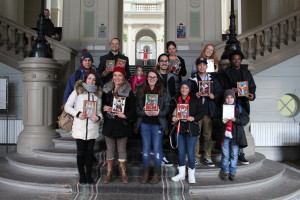
This semester, the Bellarmine College of Liberal Arts sent six Global Immersion Courses on spring break trips abroad to Cuba, England, Greece, Northern Ireland, and Ukraine. Each of these on-campus classes included a week-long international immersion trip to facilitate engaged learning beyond the classroom.
Through the newly expanded BCLA program, students studied Greek tragedy in Athens, peace-building in Belfast, Afro-Caribbean identity in Havana, Industrial Age history in Manchester, and religious ecumenism in L’viv, a Ukrainian city in the borderland of Eastern and Western Christian traditions. See course details below.
69 students from across the university participated; 31 of them received over $85,000 in need-based financial support to travel, funded by the BCLA Internationalization and Engagement Fund and the John B. and Nelly Llanos Kilroy Endowed Scholarship in BCLA.
A New Approach to Global Learning
“The purpose of a global immersion… is for students to gain a broader perspective,” said Deanna Cooke, BCLA’s Director of Engaged Learning. The travel encourages students to “place in context the theories, the lessons, the readings that they’re learning in class.”

Unlike a traditional study abroad program, Global Immersion Course students have two months of class before they travel, preparing them for what they experience abroad.
Students in “Eastern Christian Traditions” studied Eastern Christian theology and liturgy in depth before their trip, which helped them make sense of the unique expression of Eastern Christian life that they discovered in Ukraine.
Once in Ukraine, a rigorous week of lectures, tours, and meetings collectively told the story of the Ukrainian Greek Catholic Church, a minority faith in a majority Eastern Orthodox country. The Church now plays an important role as Ukraine forges a pluralistic, post-Soviet identity. Students saw a collection of Catholic folk art, some of the only pieces in its genre to survive years of Soviet home raids. They met the Ukrainian Catholic University’s vice rector who spent a decade in a labor camp. They experienced Eastern Catholic liturgies, rich in chant music, and explored the history of Ukrainian religious iconography.
Read Professor Nicholas Denysenko’s full report on the trip here.
“We had read about Eastern Christian religion…but then we got to live it,” reported Victor Labarthe ’17, a double major in theological studies and film production.
“Cuba didn’t change…I changed”
Filmed and edited by Amy Higa ’16
The College has invested in Global Immersion Courses because of their potential to transform students’ perspectives – academically and personally. As African American Studies major Dakota Connor ’16 said in this video about his experience in Cuba, “Cuba didn’t change…I changed.”
For political science major Jeremy Selland ’17, whose “International Security” class studied post-conflict peace-building in Northern Ireland, the trip had a deep impact on his understanding of the material. After hearing firsthand from people on both sides of the longstanding conflict between Catholics and Protestants, Selland learned that “truth is often difficult – if not impossible – to find in conflict; both sides create legitimate and logical narratives which inform their actions,” he said. “These concepts could not simply be learned from readings or class discussions. They required on the ground interaction and observations.”
Faculty hope that global experiences like these transform students’ academic lives: deepening understanding of the subject matter, sparking curiosity for new research interests or even new disciplines entirely. In “Greek Tragedy in Performance,” a Classics and Archaeology course that traveled to Athens, the trip inspired at least two students to add a minor in the discipline.
And in any experience abroad, transformational learning is never limited to the syllabus and itinerary.
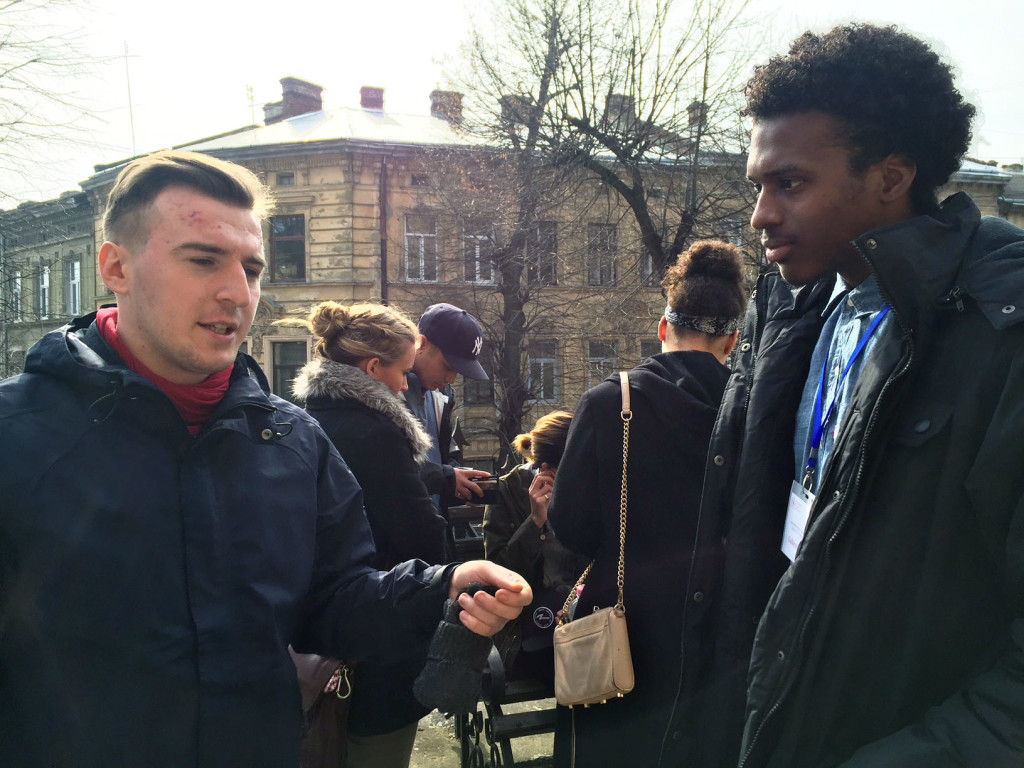
For theological studies major Cullen Caston ’19 and his classmates in Ukraine, Ukrainian college students were often their best teachers; they served as formal and informal guides who showed LMU students around the city and offered their own perspectives on faith, economics, and politics in their country. When Caston told a Ukrainian theology student that he is Baptist, he offered to take Caston on a tour of L’viv’s Baptist seminary. On the private tour, Caston spent hours exchanging ideas with the Ukrainian theology students, each offering their own perspectives on Baptist, Ukrainian Catholic, and Roman Catholic teachings on hot-button social issues.
“It’s one thing to study what people believe,” Caston said. “It’s another thing to hear real people talk about what they believe, and why.”
Like many of the students in Global Immersion Courses this spring, Caston had never left the country before the trip.
Bringing It Home
Once home, final projects in most of these courses allow students to synthesize the learning. Upon return from Manchester, England, history students in “The Artist and the Machine” created an online history exhibit for a nonprofit they visited on their trip. Students worked with archival materials to share the history of a Victorian-era social reformer, whose ideas are in practice today in a youth arts nonprofit program. Through the project, students reflected on what they learned in England, while also sharing that knowledge back with the people and groups they visited.
The Bellarmine College of Liberal Arts plans to expand the Global Immersion Course program for Spring 2017.
To help make Global Immersion Courses available to more students, visit our giving page and choose to designate the gift to the “Internationalization and Engagement Fund.”
2016 Global Immersion Courses
“African Black Psychology” and “Racial Identity and Socialization in the African Diaspora”
Professor of Psychology Cheryl Grills and Clinical Professor of African American Studies Deanna Cooke
Havana and Santiago de Cuba, Cuba
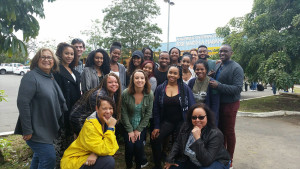 A psychology course and an African American Studies course traveled jointly to Cuba to study the expressions of race, racism and cultural identity formation in the African diaspora. Through historical tours, meetings with Cuban professors and students, and cultural events centered on Afro-Cuban art, music, and spirituality, they critically examined Cuban expressions of Black racial and cultural identities.
A psychology course and an African American Studies course traveled jointly to Cuba to study the expressions of race, racism and cultural identity formation in the African diaspora. Through historical tours, meetings with Cuban professors and students, and cultural events centered on Afro-Cuban art, music, and spirituality, they critically examined Cuban expressions of Black racial and cultural identities.
“Greek Tragedy in Performance”
Professor Katerina Zacharia
Athens, Greece
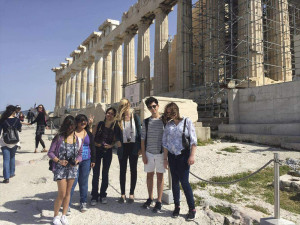 After two months of studying ancient Greek theater, this Classics and Archaeology class traveled to Athens to see the ancient playhouses and learn history at the source. The class met and worked with professional actors in the contemporary Greek theater community, who helped students workshop their own adaptations of the tragedies they studied. Students returned to the United States and performed their productions at LMU’s Classics and Archaeology Student Symposium.
After two months of studying ancient Greek theater, this Classics and Archaeology class traveled to Athens to see the ancient playhouses and learn history at the source. The class met and worked with professional actors in the contemporary Greek theater community, who helped students workshop their own adaptations of the tragedies they studied. Students returned to the United States and performed their productions at LMU’s Classics and Archaeology Student Symposium.
“International Security”
Professor Jennifer Ramos
Dublin, Ireland and Belfast, Northern Ireland
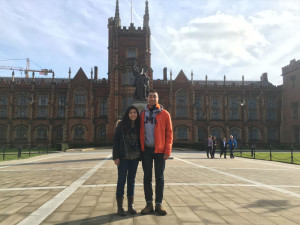 Political Science students traveled to Northern Ireland to study the ongoing work of peace-building in divided societies. Students met government officials, church leaders, and community groups, each of whom brought their own perspective to the Catholic/Protestant and Irish/British conflict in Northern Ireland and the ongoing challenges that face a post-conflict society.
Political Science students traveled to Northern Ireland to study the ongoing work of peace-building in divided societies. Students met government officials, church leaders, and community groups, each of whom brought their own perspective to the Catholic/Protestant and Irish/British conflict in Northern Ireland and the ongoing challenges that face a post-conflict society.
“Eastern Christian Traditions”
Professor Nicholas Denysenko
L’viv, Ukraine
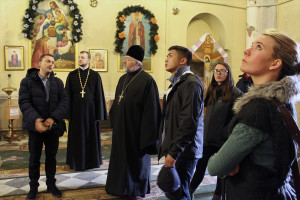 Students in this Theological Studies class traveled to a city in the borderland between Western and Eastern Christianity, to witness expressions of Eastern Christian faith, liturgy, and cultural identity in the unique political context of the former Soviet Union.
Students in this Theological Studies class traveled to a city in the borderland between Western and Eastern Christianity, to witness expressions of Eastern Christian faith, liturgy, and cultural identity in the unique political context of the former Soviet Union.
“The Artist and the Machine”
Professor Amy Woodson-Boulton
London and Manchester, England, United Kingdom
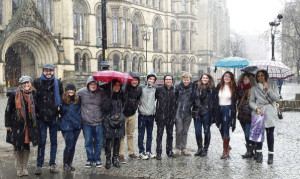 History students traveled to the heart of Victorian-era industrialization to study the ways that artists and reformers have responded to the rise of industry – then and now. By working with an arts nonprofit, students compared the human responses to industrialization in the 1800s to responses to technological/social change today. They also presented their original research at a day-long symposium at the University of Manchester.
History students traveled to the heart of Victorian-era industrialization to study the ways that artists and reformers have responded to the rise of industry – then and now. By working with an arts nonprofit, students compared the human responses to industrialization in the 1800s to responses to technological/social change today. They also presented their original research at a day-long symposium at the University of Manchester.



